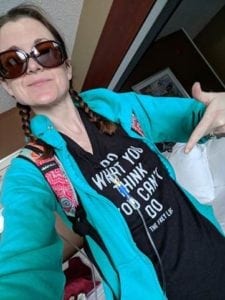My dysautonomia story starts around the year 2000, when I was 13 years old, though I never got a diagnosis until I was about 28! In the Fall of 2000, I was diagnosed with a neurological condition called reflex sympathetic dystrophy (RSD). At the same time, I was noticing that whenever I stood up, my vision would go black, and if I didn’t brace myself I would pass out. I was always told that I was standing up too fast, and that if I stood up slower, it wouldn’t happen. Although I tried standing up slower, nothing changed. I never complained about it too much, because my health surrounding RSD always took over.
In college, I noticed that I didn’t really have the issues with standing up and the black-out vision. However, once I graduated from college, it seemed to come back with a vengeance. I tried not to think about it, and tried to consciously stand up slower, though that never really changed anything.

My PCP sent me to a cardiologist, who, to my face, told me that there was nothing wrong with me, and asked why would I waste his time with a “non-issue.” I was shocked at his response, because as he was performing the “poor man’s tilt table test,” I was telling him, “okay, my vision is going black. Okay, I have zero vision now. Okay, my vision is coming back, etc.”
Although he told me there was absolutely nothing wrong with me, he offered me a script of medication. I asked why he would offer me medication if he clearly thought I was faking symptoms, and his response was, “well, if it works, then we’ll know there is something to look into.” I kindly declined his script, and left his office in tears.

Right there on her screen, he had given the diagnosis of postural orthostatic tachycardia syndrome (POTS). It is a type of dysautonomia that involves the heart. She looked at me and said, “so he NEVER gave you a diagnosis?” I told her “no,” and that he offered me medication to see if it helped my symptoms, and if they did, THEN he would give a diagnosis. She shook her head in disbelief and then told me he had sent his notes with a diagnosis. I’m pretty sure both of our jaws dropped to the ground.
I told her that I didn’t want to see another doctor for a while, because being told I was crazy didn’t feel very good. She understood, and said that she would do her best to help me manage my symptoms. She really didn’t want to rely on my port for IV fluids, so for the next year, we tried to manage my symptoms with water, Gatorade, and salt tablets. After a year, we found my weight was dropping because I was having to choose between eating food to maintain my weight or drink lots of fluids to help my POTS symptoms. In March of 2017, my PCP finally decided to let me try IV fluids and set me up with home health. I was taught how to access my port. I run 3 liters of fluid a week through my port, which has been very helpful!
Every day is a battle, dealing with chronic dehydration, chronic fatigue, dry mouth and dry eyes, and migraines. I also deal with delayed GI and colonic motility, which causes weight loss, and daily nausea. BUT, I keep pushing forward because life is for living. Some days I have to rest and recover, but on my “better” days, I try to get out and have fun, and make memories with my friends and family!







